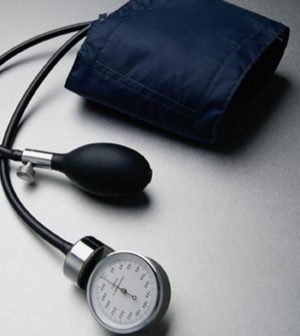- Recognizing the Signs of Hypothyroidism
- 10 Strategies to Overcome Insomnia
- Could Artificial Sweeteners Be Aging the Brain Faster?
- Techniques for Soothing Your Nervous System
- Does the Water in Your House Smell Funny? Here’s Why
- Can a Daily Dose of Apple Cider Vinegar Actually Aid Weight Loss?
- 6 Health Beverages That Can Actually Spike Your Blood Sugar
- Treatment Options for Social Anxiety Disorder
- Understanding the Connection Between Anxiety and Depression
- How Daily Prunes Can Influence Cholesterol and Inflammation
High Blood Pressure: Which Drug Works Best for You?

Two long used types of blood pressure drugs are equally effective, but the less popular one seems to have fewer side effects, according to a large “real-world” study.
The two classes of medication are both recommended as “first-line” treatments for high blood pressure: angiotensin-converting enzyme (ACE) inhibitors and angiotensin receptor blockers (ARBs).
ACE inhibitors have been around longer and studied more extensively, so doctors prescribe them more often.
But the new findings suggest that ARBs might be a better choice for people just starting on medication, the researchers said.
“There was no difference in the effectiveness of the drugs,” senior researcher Dr. George Hripcsak said. “If you’re not having side effects [with an ACE inhibitor], there’s no need to switch.”
Looking at data on nearly 3 million patients, the investigators found that ACE inhibitors and ARBs were equally effective at lowering the risks of heart disease and stroke.
Where they differed was side effects: ACE inhibitors were more likely to cause chronic cough and angioedema — severe swelling under the skin, often in the face.
People on ACE inhibitors were also slightly more likely to have gastrointestinal (GI) bleeding or inflammation of the pancreas. But those differences may have been due to chance, cautioned Hripcsak, a professor at Columbia University Vagelos College of Physicians and Surgeons, in New York City.
Going forward, he said, doctors might want to “preferentially” prescribe ARBs as a first treatment for high blood pressure. This class of drugs includes Losartan, Valsartan and Candesartan.
But people who are already using an ACE inhibitor and doing fine can stick with it. ACE inhibitors include lisinopril, captopril and fosinopril.
The study was published online July 26 in the journal Hypertension.
There is a long list of medications for high blood pressure, and guidelines recommend both ACE inhibitors and ARBs as first-line options. Both classes have been proven effective in lowering blood pressure and curbing the risks of heart disease and stroke.
But, Hripcsak said, few trials have made head-to-head comparisons of the two drug types to help doctors make decisions on which to prescribe.
So his team looked to real-world data. They used a few large databases from the United States, South Korea and Europe, with health records from nearly 3 million patients who were newly starting an ACE inhibitor or an ARB sometime between 1996 and 2018.
The large majority — almost 2.3 million — were prescribed an ACE inhibitor as their single blood pressure medication. The rest (almost 674,000) were started on an ARB.
Overall, the study found, there was no clear difference between the two groups in their average risk of suffering a heart attack, stroke or heart failure.
ACE inhibitor patients were, however, three times more likely to develop angioedema, and 32% more likely to develop a persistent cough, the findings showed.
The risks of GI bleeding and pancreatitis were also slightly higher among ACE inhibitor users. But those figures did not hold up to a statistical analysis the researchers performed, which means they could be chance findings.
Dr. Willie Lawrence is a cardiologist at the Center for Better Health, in Benton Harbor, Mich. He said that, in his experience, GI bleeding and pancreatitis have not been issues with the medications.
On the other hand, angioedema and “ACE cough” are well-known potential side effects, said Lawrence, who heads the American Heart Association’s National Hypertension Control Initiative Oversight Committee.
There has already been a sense that ARBs are less likely to cause those problems, Lawrence said. But since ACE inhibitors have been available longer, doctors are inclined to prescribe them more often, he added.
“I think this study raises the question of whether it’s better to just go straight to an ARB,” Lawrence said.
But, he noted, the study does not provide a solid answer: There are inherent limits to observational studies such as this, which track patients given a particular treatment in the real world. Controlled clinical trials, which are designed to specifically test a treatment, offer better evidence.
However, it’s unlikely anyone will conduct a trial pitting ACE inhibitors against ARBs, Lawrence said. Both drug classes are already widely used and available as inexpensive generics, so there’s no incentive for drug makers to run expensive trials.
“I think patients should be aware that ACE inhibitors can cause cough and angioedema, and if you develop those symptoms, tell your primary care provider,” Lawrence said.
But, like Hripcsak, he said that patients who are faring well with an ACE inhibitor have no reason to make a change.
More information
The American Heart Association has advice on managing high blood pressure.
SOURCES: George Hripcsak, MD, professor and chair, biomedical informatics, Columbia University Vagelos College of Physicians and Surgeons, New York City; Willie Lawrence, MD, head, National Hypertension Control Initiative Oversight Committee, American Heart Association, Dallas, and interventional cardiologist, Center for Better Health, Benton Harbor, Mich.; Hypertension, July 26, 2021, online
Source: HealthDay
Copyright © 2026 HealthDay. All rights reserved.










